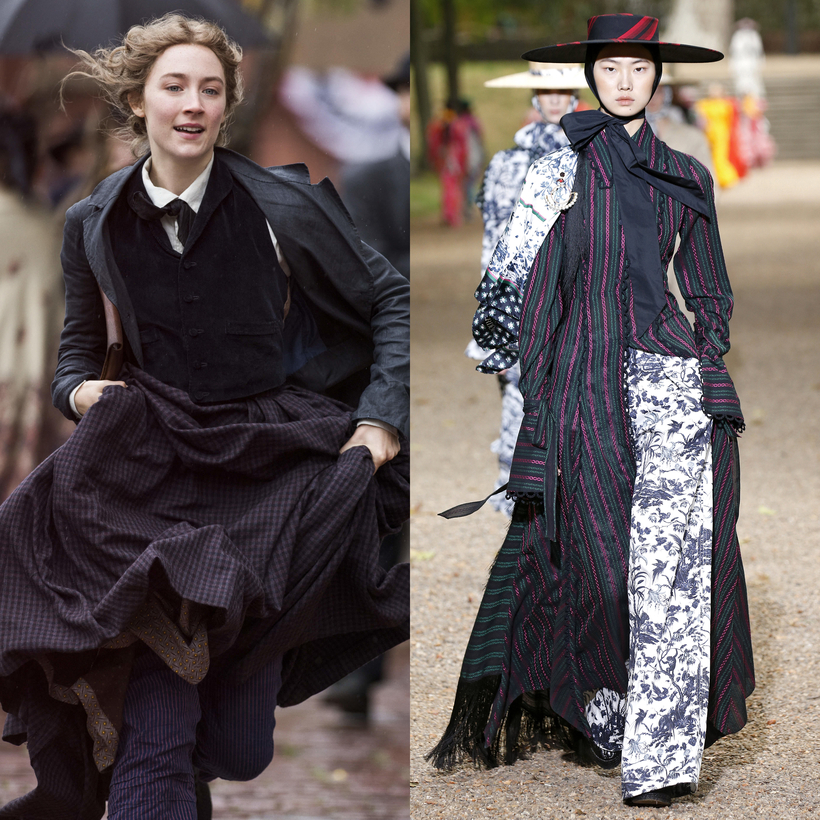“Dear me, let us be elegant or die” is the narrator’s eye-rollingly sardonic verdict on fashion, in the 1868 classic novel Little Women. As the March sisters dress for a party, author Louisa May Alcott places writerly emphasis firmly on the downsides of glamour: Jo with her 19 hairpins “all seemed stuck straight into her head, which was not exactly comfortable” and Meg’s high heels were “very tight and hurt her”.
But as the sixth feature film adaptation arrives in cinemas, fashion has claimed the March sisters as its own. With their puff-sleeve cotton blouses and velvet party dresses, lace-up ankle boots and long braids, Greta Gerwig’s quartet of actors – Saoirse Ronan, Florence Pugh, Emma Watson and Eliza Scanlen – have an Instagram-friendly aesthetic that is decidedly contemporary. 150 years after their birth, Alcott’s heroines have become fashion influencers.
Alcott’s heroines have become fashion influencers.
The purple evening dress seen in the film on Watson’s Meg would not have looked out of place on Erdem’s Autumn/Winter 2019 catwalk, and her sparkling hairslides are a dead ringer for the cult Simone Rocha accessories which are on every millennial’s Christmas list. Ronan’s Jo wears voluminous tiered dresses in muted tones of rust or olive that echo the trademark silhouette of London fashion week’s Molly Goddard. The spriggy bibbed dresses and quilted jackets in Laura Ashley florals worn by Laura Dern as Marmee would likely spark a millennial bidding war on eBay, where vintage Laura Ashley is a hot search term.

“Civil War chic” is very much on trend. Hipsters in New York wear ruffle-trimmed, bib-front vintage dresses, and drink artisanal cocktails out of Mason jars on dates with bearded young men in Henley shirts and workboots. Batsheva Hay, the cult designer whose puff-sleeved dresses in cotton florals and velvet corduroys are beloved by Lena Dunham and Chloë Sevigny, describes her fashion philosophy as “taking elements symbolic of restraint and repression (high collars, voluminous sleeves and shirts) and giving them a modern inflection.” LoveShackFancy, inspired by the vintage dresses which designer Rebecca Cohen wore as a child, does a brisk trade in gingham and broderie anglaise bodices matched with tiered skirts and has recently expanded into childrenswear, with bridalwear in the pipeline.
“Civil War chic” is very much on trend.
The mainstreaming of this look is evidenced on this side of the Atlantic by its prominence at Marks & Spencer, where a high-necked, smocked-waist dress in a muted leaf print, with ankle-length hemline and vintage-style covered-button fastening, is on sale for £45. For her Downing Street photocall following the general election, Boris Johnson’s partner, Carrie Symonds, wore a £45 pair of M&S sturdy lace-up ankle boots remarkably similar to those worn by Ronan as Jo March running cross-country errands.
“What I did was to create historically accurate pieces, but then let them be worn in a way that the girls were comfortable with,” the film’s costume designer Jacqueline Durran has said. The synergy between Little Women’s costume design and the contemporary moment reflects the modern spirit and attitude of a book which pits girlish independence of spirit against a patriarchal society. Through the device of the four contrasting sisters, Alcott explores different paths to female self-actualisation, a theme that feels resonant for today’s young women.
The film’s line that “morals don’t sell, nowadays” is taken directly from the novel – but in fact, the principles illustrated by the story are central to its modern appeal.
Vintage Laura Ashley is a hot search term.
The emphasis on a thrifty, sustainable lifestyle appeals to a millennial audience, and is illustrated by the film’s clothes, with their washed-out, hand-me-down prints and sturdy, practical shapes. Clara Francis, designer of new British sustainable fashion label O Pioneers, took the name from a Walt Whitman poem, and describes her aesthetic – handcrafted dresses with ruffles at the neck and elbow, styled under knitted tank tops for warmth – as nostalgia “brought up to date and made wearable for modern life”.

Many of her customers are women who are “bored of their ‘mummy uniform’ of jeans, jumpers and trainers – and perhaps tiring of mass-produced, cheaply made clothing which ultimately means someone down the line is being exploited.”

